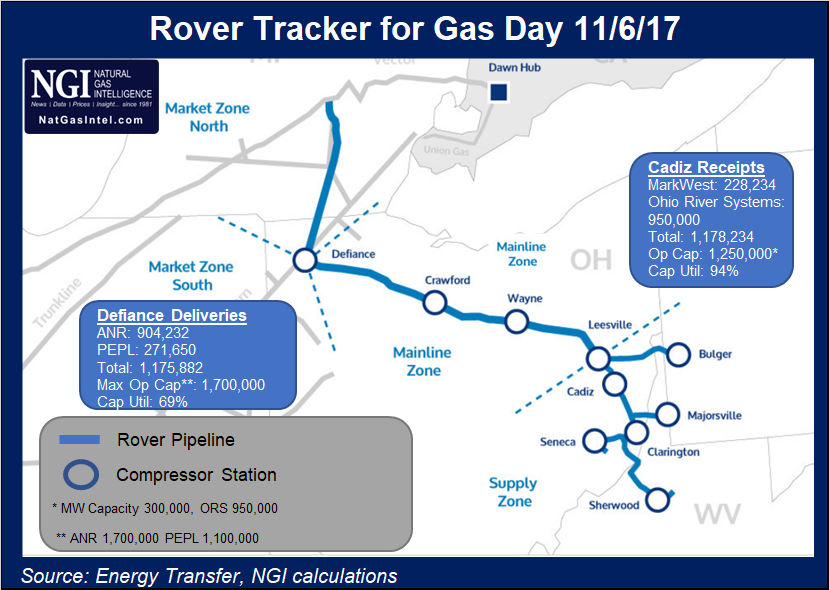Utica Shale | E&P | Marcellus | NGI All News Access | NGI The Weekly Gas Market Report | Regulatory
Ohio AG Sues Rover Pipeline Over Water Quality Violations
The state of Ohio is suing Rover Pipeline LLC over numerous alleged water quality violations occurring during the 713-mile greenfield project’s construction in the state, Ohio Attorney General (AG) Mike DeWine announced Friday.

Seeking civil penalties and enforcement of various orders and permit requirements previously handed down by the Ohio Environmental Protection Agency (Ohio EPA), DeWine’s office filed suit Friday in the Court of Common Pleas in Stark County, OH.
It was in Stark County that a horizontal directional drilling (HDD) fluids spill near the Tuscarawas River occurred during Rover construction in April. The incident caused delays after FERC, responding to a request from Ohio EPA, stepped in to halt certain HDD activities on the project pending an independent review.
Friday’s complaint details the Tuscarawas incident — which released an estimated 2 million gallons of drilling fluids into a nearby wetland, according to FERC — and several other inadvertent releases along Rover’s route through Ohio.
“Rover illegally discharged millions of gallons of drilling fluids to Ohio’s waters, causing pollution and degrading water quality on numerous occasions and in various counties across the state,” according to the Ohio AG’s complaint, which also accuses Rover of failing to obtain a stormwater permit and not submitting timely payment of fees associated with its Clean Water Act Section 401 permit.
“…Whether its actions (and failures to act) stem from a series of calculated business decisions or complete indifference to Ohio’s regulatory efforts, Rover has endangered the environment in more than 10 counties (including Stark) and violated state laws, rules and permits designed to protect the quality of Ohio’s waters.”
Among other things, the Ohio AG asked the court to order Rover to move forward with obtaining a construction stormwater permit; comply with various Ohio EPA environmental restoration and monitoring plans; and pay civil penalties totaling $10,000 “for each day of each violation.”
Ohio EPA Director Craig Butler has said the agency is seeking roughly $2.3 million in penalties and reimbursements from Rover.
Ohio EPA and Rover developer Energy Transfer Partners LP (ETP) have butted heads seemingly ever since the project began construction earlier this year.
ETP has challenged Ohio EPA’s enforcement authority and accused the agency of seeking an “unreasonable and unwarranted” amount in civil penalties.
Earlier this year, Butler wrote to DeWine to seek the Ohio AG’s help in enforcing penalties against Rover after negotiations between the two parties broke down.
Still, Rover has largely complied with Ohio EPA’s requirements to date (partly due to FERC’s conditions for in-service authorization). Ohio EPA has pointed to the storm water permit as the last remaining outstanding issue. Rover has said that it submitted a stormwater pollution prevention plan that makes the storm water permit unnecessary.
“We have worked cooperatively with the Ohio EPA for the past six months to resolve this matter in a way that is satisfactory to all parties involved,” ETP spokeswoman Alexis Daniel said in an email to NGI’s Shale Daily. “We are therefore disappointed that they have resorted to litigation when Ohio EPA has acknowledged publicly that Rover has complied with all applicable environmental laws. This will not affect our construction timeline. Beyond that, we do not comment on current or pending legal issues.”
Rover, a 3.25 Bcf/d interstate pipeline designed to deliver Marcellus and Utica shale gas to markets in the Midwest, Gulf Coast and Canada, is scheduled to enter full-service by the end of the first quarter.
The pipeline started partial service at the start of September and has been flowing about 1 Bcf/d east-to-west from Cadiz, OH, to Defiance, OH. With HDD work back underway, the project is scheduled to complete another incremental phase of construction by the end of the year.
© 2024 Natural Gas Intelligence. All rights reserved.
ISSN © 2577-9877 | ISSN © 1532-1266 | ISSN © 2158-8023 |
